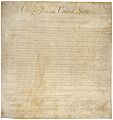Fifth Amendment to the United States Constitution facts for kids
The Fifth Amendment to the United States Constitution is a very important part of the United States Bill of Rights. It was created on December 15, 1791. This amendment gives people several legal rights in both civil (non-criminal) and criminal cases.
The Fifth Amendment includes several key ideas. It says you have the right to a grand jury for serious crimes. It stops double jeopardy, which means you can't be tried twice for the same crime if you were already found innocent. It also protects you from self-incrimination, meaning you don't have to be a witness against yourself. People often call this "Pleading the Fifth".
The amendment also says the government must follow "due process" before taking away your "life, liberty, or property". This means the government must be fair and follow the law. Finally, if the government needs to take private property for public use, they must pay the owner a fair price.
Contents
What Does the Fifth Amendment Say?
The exact words of the Fifth Amendment are:
No person shall be held to answer for a capital, or otherwise infamous crime, unless on a presentment or indictment of a Grand Jury, except in cases arising in the land or naval forces, or in the Militia, when in actual service in time of War or public danger; nor shall any person be subject for the same offence to be twice put in jeopardy of life or limb; nor shall be compelled in any criminal case to be a witness against himself, nor be deprived of life, liberty, or property, without due process of law; nor shall private property be taken for public use, without just compensation.
Key Ideas in the Fifth Amendment
The Fifth Amendment has five main parts, often called "clauses." Each one protects a different right.
What is a Grand Jury?
The Fifth Amendment says that for very serious crimes, like those that could lead to the death penalty, the federal government must use a grand jury. A grand jury is a group of citizens who decide if there is enough evidence to formally accuse someone of a crime. They don't decide if someone is guilty or innocent. They just decide if the case should go to a full trial. The idea of grand juries started a long time ago in England, around 1166. Today, the United States is one of the few countries that still uses them.
What is Double Jeopardy?
The Double Jeopardy clause means that once a person has been found innocent or guilty of a crime, they cannot be tried again for that exact same crime. This rule stops the government from trying to convict someone over and over again for the same act. It protects people from endless trials and makes sure that once a case is decided, it stays decided.
What is Self-Incrimination?
This part of the Fifth Amendment protects your right to remain silent. It means you cannot be forced to say anything that could be used against you in a criminal case. This is often called "taking the Fifth" or "pleading the Fifth." The main goal is to prevent the government from forcing someone to confess to a crime.
You don't have to answer questions under oath if your answer could lead to you being charged with a crime. Since 1966, thanks to a famous court case called Miranda v. Arizona, police officers must tell people their "right to remain silent" when they are arrested. This is part of the well-known Miranda warning.
What is Due Process?
The Due Process clause guarantees that everyone gets fair and orderly treatment by the law. It means the government must follow the rules and laws when dealing with people. For example, a judge cannot show unfairness against someone in a trial. Also, the prosecution must share information with the defense that could show the defendant is innocent.
The Fifth Amendment's due process rule applies to the federal government. However, the Fourteenth Amendment to the United States Constitution later made sure that states and local governments must also follow due process. This means all levels of government must treat people fairly under the law.
What is the Takings Clause?
The Takings Clause says that if the government needs to take private property for public use, they must pay the owner a fair price. This is often called "eminent domain." For example, if the government wants to build a new road or school, they might need to buy private land. If the owner doesn't want to sell, the government can go to court to take the property. But they must pay "just compensation," which means the property's true value.
A famous case about this was Kelo v. City of New London in 2005. The U.S. Supreme Court allowed the city to take private property from one owner to give to another private owner. The city believed the new owner would improve the area for public benefit. This decision was very controversial because it expanded what "public use" could mean.
Images for kids
-
James Madison, who helped write the Bill of Rights.
-
The Bill of Rights, kept at the National Archives.
See also
 In Spanish: Quinta Enmienda a la Constitución de los Estados Unidos para niños
In Spanish: Quinta Enmienda a la Constitución de los Estados Unidos para niños



